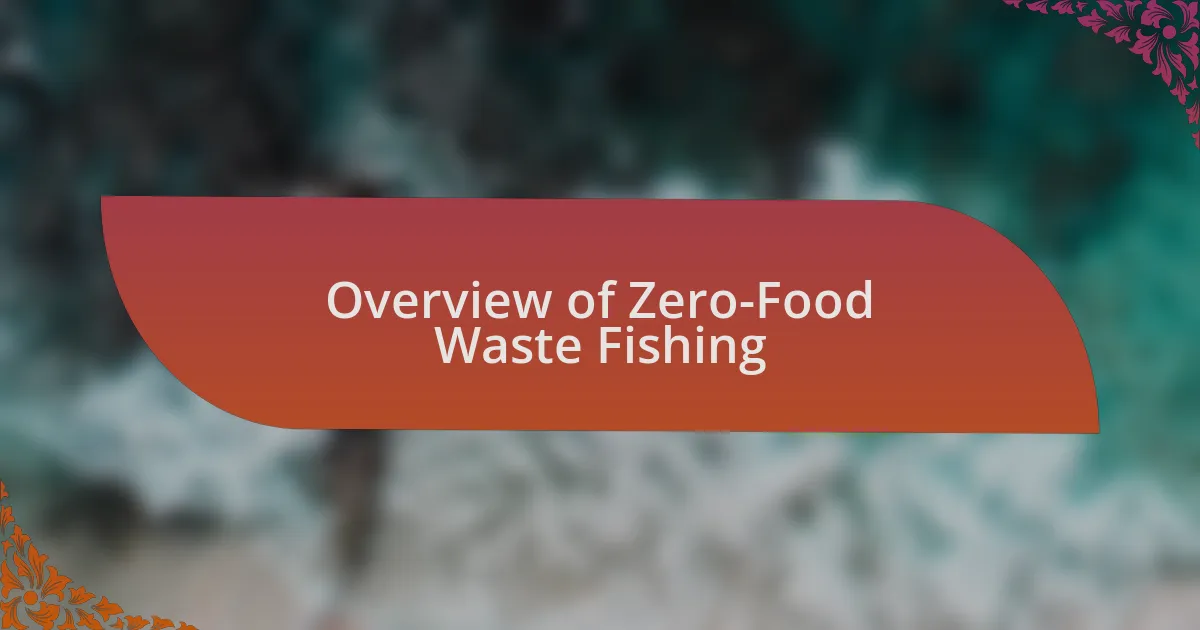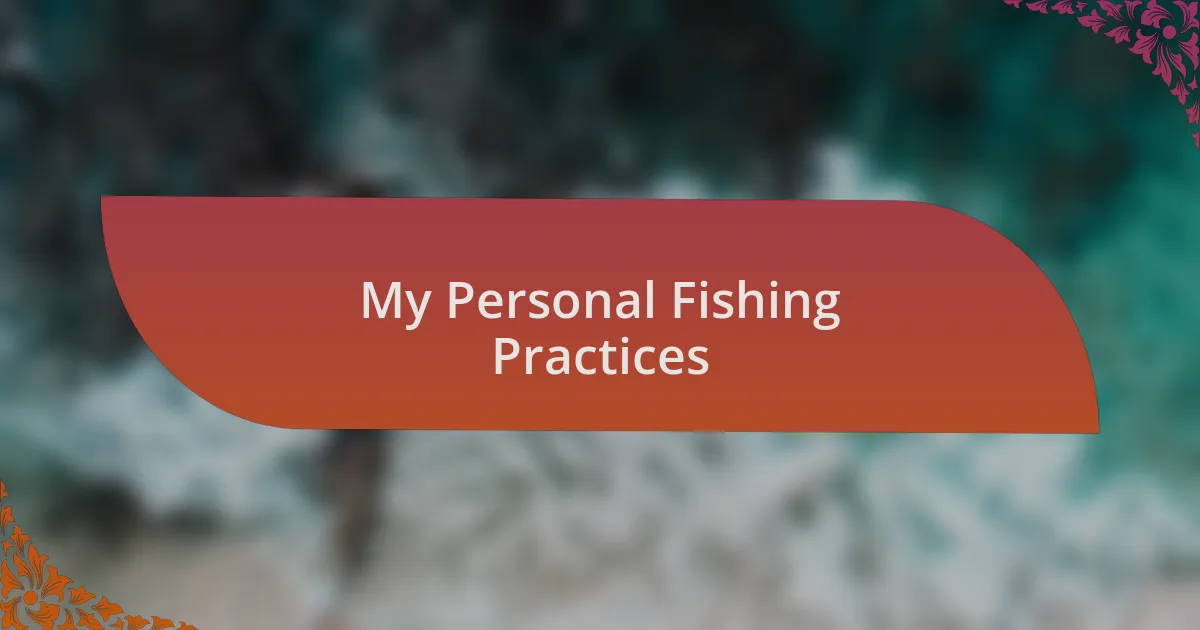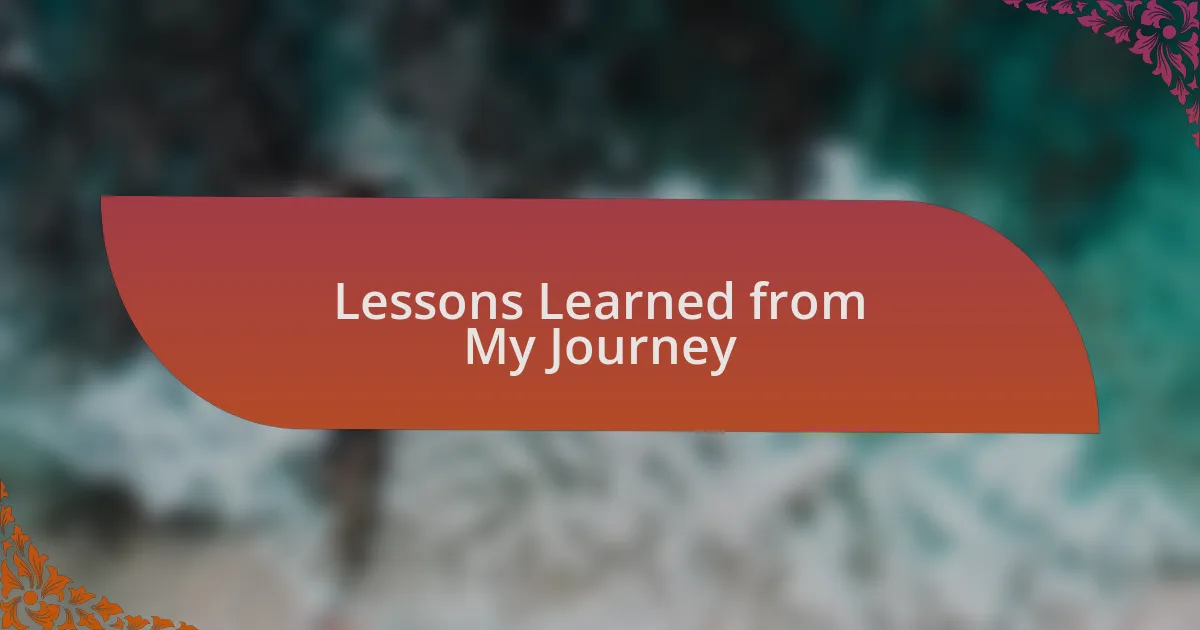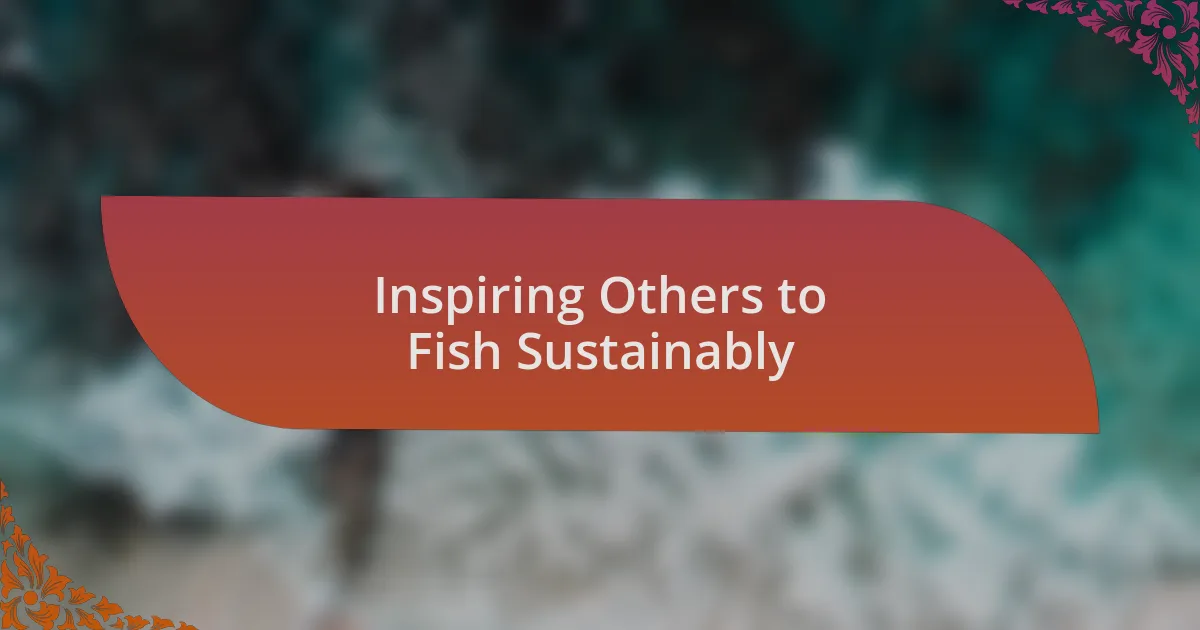Key takeaways:
- Ocean conservation is essential for maintaining the balance of marine ecosystems and ensuring future generations can enjoy ocean resources.
- Reducing waste in fishing enhances sustainability, respects the ocean, and supports local communities by preserving fish stocks.
- Adopting zero-food waste fishing practices leads to creative uses of all parts of the catch, fostering appreciation for marine life.
- Education and storytelling are powerful tools in inspiring others to engage in sustainable fishing practices and foster community commitment to conservation.

Understanding Ocean Conservation
Ocean conservation isn’t just an environmental issue; it’s a crucial part of our global ecosystem and future. I recall standing on the beach one day, watching fishermen pull in their nets filled with fish, but also with unwanted bycatch—creatures that would ultimately die because they were caught inadvertently. It made me ponder: how many lives are affected by our fishing practices, and what can we do to change that?
Every drop of ocean water is home to an intricate web of life, and protecting it ensures that future generations can enjoy its beauty and bounty. I often think about the stunning coral reefs I’ve had the privilege to snorkel through—a vibrant battleground for survival, now threatened by pollution and climate change. Why should we let these colors fade away?
Understanding ocean conservation involves recognizing our connection to these waters and the creatures that inhabit them. During my own fishing trips, I’ve marveled at the array of marine life but also felt an overwhelming sense of responsibility. When I catch a fish, I consider the journey that brought it to my line and the impact I have on its population. It really drives home the idea that every action we take has a ripple effect in the oceanic ecosystem.

Importance of Reducing Waste
Reducing waste is essential not only for the health of our oceans but also for preserving the balance of marine ecosystems. On a recent fishing trip, I found myself grappling with the spoils of my catch. After filleting a fish, I stared at the discarded parts—scales, bones, and remnants—wondering how many resources and life went into producing something that would ultimately end up as waste. It served as a stark reminder: every time we let waste slip through our fingers, we’re also squandering valuable resources that our planet can’t afford to lose.
The ripple effect of waste goes beyond just the discarded fish parts; it implicates entire communities and economies that rely on ocean health. I remember chatting with a local fisherman who lamented the declining fish stocks due to overfishing and pollution. He shared stories of vibrant days when nets bulged with fish, comparing them to the empty hauls of today. Isn’t it sobering to think that when we waste, we not only affect an individual species but the livelihood of those who depend on them? Reducing waste can directly contribute to restoring the abundance of our oceans and sustaining fisheries for future generations.
Moreover, cutting down on waste fosters a culture of respect for our oceans and all their inhabitants. I’ve engaged with various sustainable fishing practices, feeling the shift in my own mindset as I adopted a “catch and use” approach. Each time I returned home with my catch, I made a conscious effort to fully utilize every part of the fish, whether in the kitchen or as bait for future outings. It’s a small shift, but it ignites a larger movement—what if everyone embraced this mentality? Wouldn’t we be taking a giant step toward healing our seas?

Overview of Zero-Food Waste Fishing
Zero-food waste fishing represents a transformative approach to sustainable fishing practices, aiming to minimize waste at every step of the process. During one of my fishing outings, I was struck by the realization that everything from the seemingly inedible fish head to the surplus bait could be repurposed. It prompted me to consider just how much more we could benefit from our catches with a little creativity and effort.
Incorporating the philosophy of zero-food waste fishing can significantly change our relationship with the sea. For instance, I once experimented with making fish stock from the bones and scraps of a catch that I typically would have discarded. The rich flavors that emerged reminded me that nothing should go to waste; there’s a world of culinary potential concealed within those leftovers. This mindset not only leads to less waste but also fosters a deeper appreciation for the life and resources we take from our oceans.
Adopting this approach isn’t just about efficiency; it’s about honoring the ocean and its bounty. I often think back to moments when I’ve shared meals prepared from every part of the fish with friends and family. Their reactions, filled with surprise and delight, reinforced the idea that we can turn what we once deemed waste into something valuable and celebratory. How can we truly honor the ocean if we don’t fully embrace and respect its offerings?

Strategies for Sustainable Fishing
Sustainable fishing strategies hinge on a deep respect for marine ecosystems. I remember a day on the boat when my fishing buddy and I decided to implement catch-and-release practices for smaller fish. It felt empowering to know that these little guys had a chance to grow and contribute to the population, reminding me of the delicate balance we must maintain in our waters.
Another effective approach is diversifying our targets beyond popular species. One afternoon, I stumbled upon an abundance of lesser-known fish on a trip, which I had previously overlooked. Trying out these new catches not only expanded my culinary repertoire but also eased pressure on overfished species. Isn’t it thrilling to discover new flavors while supporting ocean health at the same time?
Finally, incorporating local knowledge into our fishing practices can yield remarkable results. During my conversations with regional fishermen, I learned about seasonal variations that affect fish populations. Understanding these patterns reshaped my fishing schedule, aligning my efforts with nature’s rhythm. Isn’t it fascinating how much wisdom lies in our communities, waiting to be utilized for the good of our oceans?

My Personal Fishing Practices
When I think about my personal fishing practices, two words come to mind: intention and mindfulness. I make it a point to only take what I truly need, leaving the rest to thrive. There’s a certain satisfaction in knowing that each time I go out, I’m leaving a portion of the ecosystem intact, and it pushes me to fish with purpose—every catch counts.
One memorable trip stands out clearly in my mind. I had planned to return home with a specific fish in mind, but when I noticed a school of juveniles swimming nearby, I hesitated. Watching them dart about, I was reminded of the idea that every fish deserves a chance to mature and reproduce. I decided to let my net rest that day, fostering a deeper connection with the natural world around me. Isn’t there something beautiful about choosing conservation over consumption?
I’ve also adopted the practice of utilizing every part of the fish I catch. I remember my grandmother’s teachings about minimizing waste in the kitchen. After filleting my latest catch, I made a delightful fish stock using the bones and scraps. It not only enriched our family meals but also brought a sense of nostalgia and gratitude for the ocean’s gifts. How often do we miss out on the full experience of our resources simply by focusing on the primary product?

Lessons Learned from My Journey
Every fishing trip has taught me the importance of respect for the ocean and its creatures. I learned this lesson on a particularly windy day when I mistakenly targeted a species that was out of season. Returning home, I felt a pang of guilt as I realized my error. It became clear that understanding local fishing regulations isn’t just a legal responsibility; it’s a moral one. How can we cherish the ocean’s bounty without acknowledging the delicate balance that sustains it?
Another key insight has been the power of community engagement. I recall a local conservation event where we shared tips and delicious recipes for using every part of a fish. Conversations with fellow anglers opened my eyes to different ways of thinking about the fishing experience. Have you ever learned something unexpected from a stranger? In my case, it’s heartening to see how collaboration can lead to more sustainable practices and deepen our commitment to both fishing and conservation.
Lastly, I’ve come to value patience in my fishing journey. I remember standing on the shore for hours one evening, not catching anything but still finding joy in the stillness of the water. This taught me that fishing is about more than just the catch; it’s also about appreciating the moment. Isn’t there a richness in soaking up the beauty of our surroundings? Each experience has unfolded new layers of understanding, shaping my approach to sustainable practices.

Inspiring Others to Fish Sustainably
In sharing my journey towards zero food waste in fishing, I’ve found that storytelling can ignite passion in others. When I told a friend about the time I crafted a flavorful stock from fish bones, their eyes lit up with excitement. It’s moments like these that reinforce my belief that the knowledge we share about using every part of our catch can transform not just attitudes but behaviors as well. How many untapped recipes are just waiting to be discovered by fellow anglers?
Education plays a crucial role in inspiring sustainable fishing practices. I remember hosting a small gathering where we discussed the importance of ethical fishing methods. As I recounted tales of close encounters with marine life and the harsh realities of overfishing, the room filled with a mix of awe and concern. It struck me that by connecting our personal experiences with the data on fish populations, we can create an emotional investment in responsible fishing. Isn’t it powerful to know that our choices can echo in the ocean long after we’ve left the shoreline?
A key part of inspiring sustainable fishing is leading by example. On a recent trip, I made sure to show others how to identify local species that were in season and those that weren’t. I felt a deep sense of fulfillment when I noticed a group of novice fishers start to adopt those practices. It was a reminder that actions speak louder than words. Might your own fishing trips serve as a platform to inspire change in your community, too?